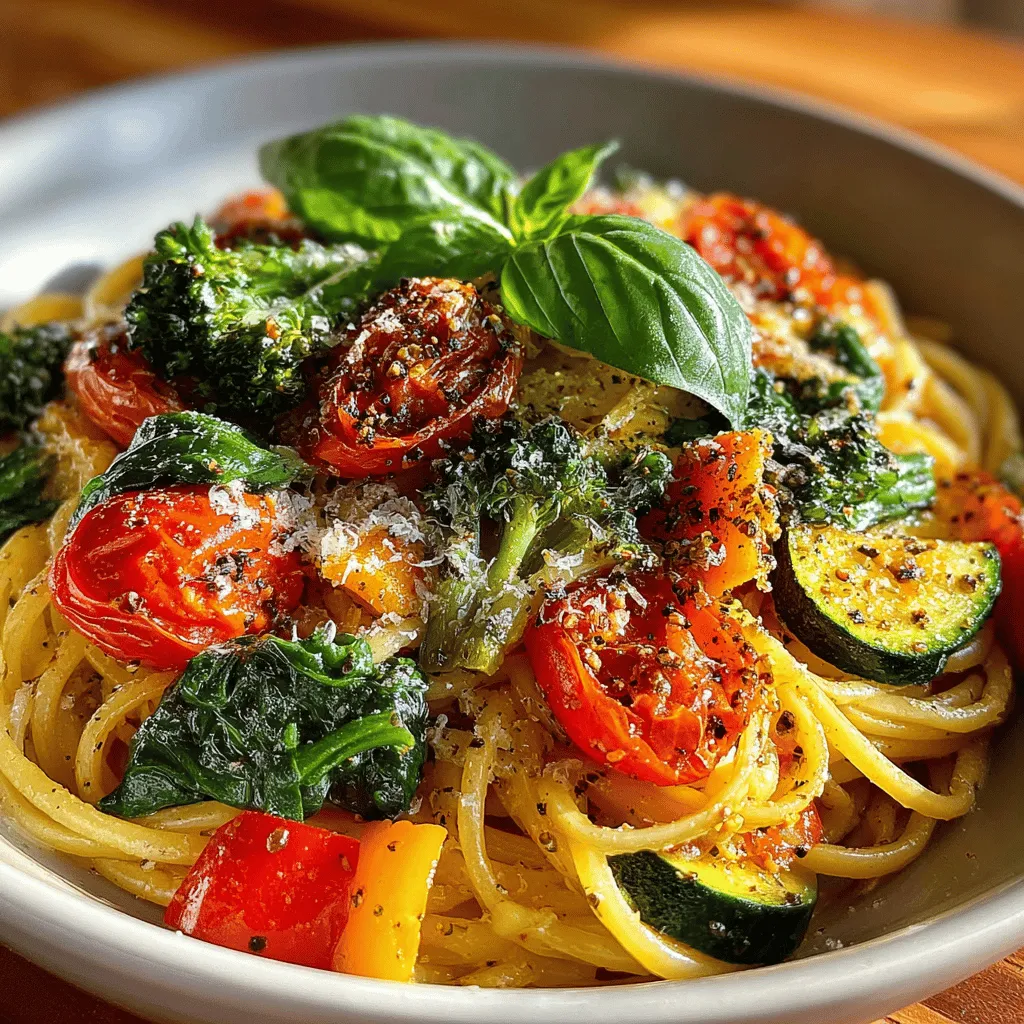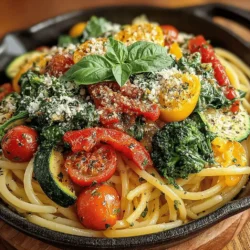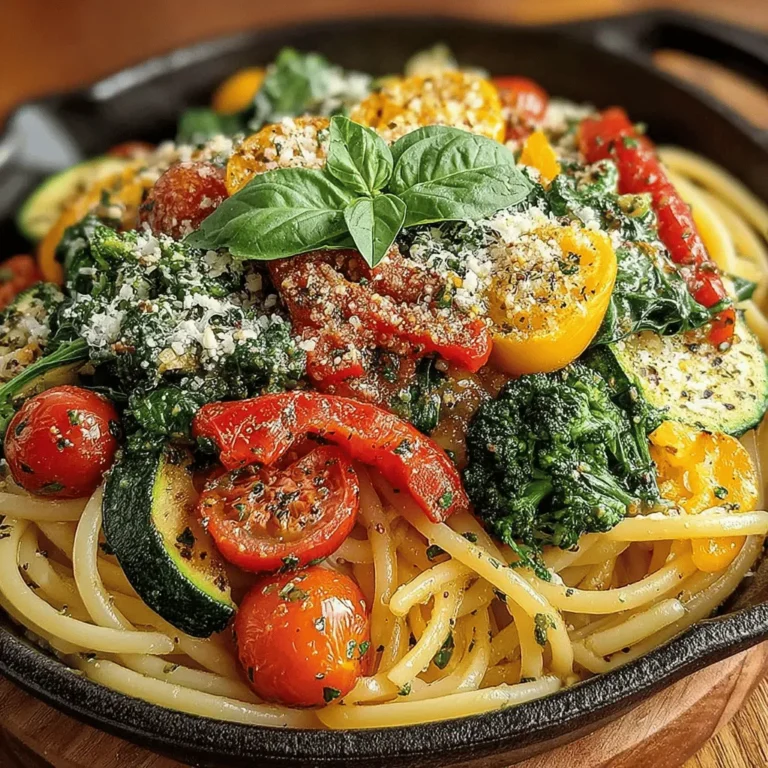Introduction to Spring Fling Pasta Primavera
In the vibrant world of seasonal cooking, few dishes capture the essence of spring as beautifully as Pasta Primavera. This delightful recipe combines fresh vegetables and al dente pasta, making it a perfect choice for a light yet satisfying meal. The Spring Fling Pasta Primavera is not only colorful and appetizing but also quick and easy to prepare, making it an ideal option for busy weeknights or special occasions. Let’s explore this refreshing dish that celebrates the bounty of spring produce while being adaptable for various dietary preferences.
Ingredients
– 12 oz linguine or spaghetti
– 2 tablespoons olive oil
– 1 cup broccoli florets
– 1 cup bell peppers (red and yellow), sliced
– 1 cup cherry tomatoes, halved
– 1 cup spinach leaves
– 3 cloves garlic, minced
– 1 teaspoon salt
– 1/2 teaspoon black pepper
– 1 teaspoon dried oregano
– 1/4 cup fresh basil, chopped
– Grated Parmesan cheese, for serving (optional)
Instructions
1. Begin by bringing a large pot of salted water to a boil. Add the linguine or spaghetti and cook according to package instructions until al dente. Reserve 1/2 cup of pasta water, then drain the pasta and set aside.
2. In a large skillet, heat the olive oil over medium heat. Add the minced garlic and sauté for about 30 seconds until fragrant.
3. Add the broccoli florets and bell peppers to the skillet. Sauté for 4-5 minutes until they begin to soften.
4. Stir in the cherry tomatoes and spinach. Cook for an additional 2-3 minutes until the spinach wilts and the tomatoes soften.
5. Season the vegetables with salt, black pepper, and dried oregano. Mix well to ensure even seasoning.
6. Add the cooked pasta to the skillet, tossing everything together. If the mixture seems dry, add a splash of the reserved pasta water to achieve your desired consistency.
7. Remove from heat and stir in the fresh basil. Serve immediately, garnished with grated Parmesan cheese if desired.
Understanding the Ingredients
Exploring the Core Elements of Pasta Primavera
Pasta Primavera is a dish that shines due to its fresh, seasonal vegetables. The star ingredients include vibrant broccoli, sweet bell peppers, and juicy cherry tomatoes, which not only add color but also a variety of textures and flavors. The choice of pasta, typically long varieties like linguine or spaghetti, complements the dish’s overall aesthetic and ensures a satisfying bite.
Nutritional Benefits of Key Ingredients
Each component of Pasta Primavera brings its own set of nutritional benefits. Broccoli is rich in vitamins K and C, while bell peppers are packed with antioxidants and vitamin A. Spinach is a powerhouse of iron and folate, making this dish not only visually appealing but also a health-conscious choice. By incorporating a variety of colorful vegetables, you create a meal that offers a wide range of nutrients.
Choosing the Right Pasta for Primavera
Selecting the right type of pasta is crucial in achieving the desired texture and flavor profile of Pasta Primavera. Linguine and spaghetti are excellent choices as they allow the sauce and vegetables to cling beautifully, ensuring every bite is flavorful. Cooking the pasta to al dente is key, as it provides a firm texture that holds up well against the sautéed vegetables.
Preparation Process
Step-by-Step Guide to Crafting the Perfect Pasta Primavera
Creating the perfect Pasta Primavera involves a few simple yet essential steps. Start by cooking the pasta to the right texture and preparing the vegetables for sautéing. Each step plays a significant role in ensuring the flavors meld together harmoniously, resulting in a dish that is both delicious and satisfying.
Cooking the Pasta to Perfection
Cooking pasta al dente is paramount in any pasta dish. This method involves boiling the pasta until it is firm to the bite, which prevents it from becoming mushy when combined with the sautéed vegetables. The slight resistance in the pasta enhances the overall mouthfeel of the dish, contributing to a more enjoyable dining experience.
Sautéing Vegetables for Optimal Flavor
Sautéing vegetables correctly is an art that can elevate your Pasta Primavera. Start with high heat to quickly sear the vegetables, allowing them to retain their vibrant colors and essential nutrients. Aim for a balance between tenderness and crunch; the vegetables should be cooked through but still crisp enough to provide texture against the soft pasta. Use fresh herbs and seasonings to enhance the flavors and create a symphony of tastes in every bite.

Flavor Profile and Seasoning
Essential Herbs and Spices in Pasta Primavera
The flavor profile of Pasta Primavera is greatly enhanced by the careful use of herbs and spices. Dried oregano and basil are essential in providing a fragrant backdrop that complements the freshness of the vegetables. Oregano adds a warm, slightly bitter flavor, while basil contributes a sweet, aromatic essence that brightens the dish. For those who enjoy a bit of heat, consider adding red pepper flakes to the mix. This optional ingredient can elevate the dish by providing a pleasant spiciness that balances the natural sweetness of the spring vegetables.
The Importance of Seasoning in Cooking
Proper seasoning is crucial in elevating the flavors of any dish, and Pasta Primavera is no exception. Start with a base of salt and taste as you go. Remember that the saltiness of cheese, particularly Parmesan, will also contribute to the overall seasoning, so adjust accordingly. A good practice is to taste the dish at different stages of cooking; this will help you identify any adjustments needed. A dash of freshly cracked black pepper can also enhance the flavor, so don’t hesitate to experiment with the seasoning until it meets your personal preference.
Serving and Presentation
Garnishing for Visual Appeal
Presentation plays a vital role in the dining experience, and garnishing your Pasta Primavera can elevate its visual appeal significantly. Fresh basil leaves not only add a pop of color but also enhance the aroma as they release their essential oils. A sprinkle of additional grated Parmesan cheese on top can create a beautiful finish, enticing your guests even before they take their first bite. Consider using a colorful serving bowl to showcase the vibrant vegetables, making your dish as delightful to look at as it is to eat.
Ideal Pairings with Pasta Primavera
To create a well-rounded meal, consider pairing your Pasta Primavera with complementary side dishes. A simple arugula salad with lemon vinaigrette can provide a refreshing contrast to the richness of the pasta. For those who enjoy wine, a crisp white wine, such as Pinot Grigio or Sauvignon Blanc, can enhance the flavors of the dish beautifully. Additionally, crusty garlic bread can serve as a perfect accompaniment, allowing diners to savor every bit of the flavorful sauce.
Variations of Spring Fling Pasta Primavera
Customizing the Dish for Different Diets
Pasta Primavera is incredibly versatile, making it easy to adapt for various dietary preferences. For those following a vegan diet, simply omit the cheese or use a plant-based alternative, and ensure that the pasta is made from whole grains or legumes. Gluten-free options are also widely available, allowing everyone to enjoy this delightful dish. Feel free to mix in seasonal vegetables that are available in your area, such as asparagus, peas, or bell peppers, to keep the dish vibrant and fresh.
Incorporating Protein into the Recipe
Adding protein to Pasta Primavera can transform it into a heartier meal. Grilled chicken or shrimp are popular choices that complement the dish without overpowering its fresh flavors. For a plant-based option, consider adding chickpeas or tofu, which can easily absorb the flavors of the dish. These additions not only enhance the nutritional value but also make the recipe suitable for a variety of eating habits.
Conclusion: Embracing Seasonal Cooking with Spring Fling Pasta Primavera
Embracing seasonal cooking through dishes like Spring Fling Pasta Primavera allows you to celebrate the bounty of spring. This recipe not only highlights the beauty and freshness of spring vegetables but also serves as a canvas for culinary creativity. I encourage readers to experiment with their variations, discovering new flavors and combinations that reflect the changing seasons. This dish nourishes the body and delights the senses, making it an essential addition to any home cook’s repertoire. Enjoy the freshness, flavor, and joy that each season brings with this delightful pasta dish.

